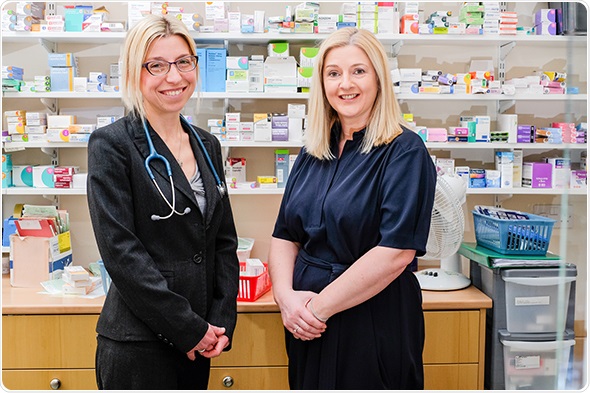The NHS could make substantial savings in the future thanks to an innovative pilot project aimed at reducing the number of people suffering fractures.
Bone fractures affect millions of people across the UK with 1 in 2 women and 1 in 5 men over the age of 50 suffering from them . The cost of fragility fractures place a substantial economic burden on the health and social care system with the costs of fragility fractures in the region of £2.3bn .

These pressures on the NHS are expected to continue as increased rates of falls, and the associated consequences, are expected to rise as the population ages.
However, a pilot project based in Northumberland has identified an innovative process to help reduce the number of fragility fractures by adopting an early intervention approach.
The Improving Bone Health and Falls Prevention project worked with a group of GP practices to test a system which uses an audit tool to identify registered patients at risk of fragility fractures – which are often linked to osteoporosis - allowing doctors to offer preventative advice or treatment.
The project was led by Hadrian Primary Care Alliance in partnership with ProStrakan, Interface Clinical Services and the Academic Health Science Network for the North East and North Cumbria (AHSN NENC).
Hadrian Primary Care Alliance is a federation of 13 GP practices in West Northumberland, a rural area with a population of 78,000 where more than 1 in 4 residents are over 65.
The pilot, which was rolled out last year, is estimated to have saved almost £175,000 in future hospitalisation and follow up care costs associated with hip fractures. The project is part of a significant programme of fractures prevention work being undertaken at the AHSN NENC.
Jill Mitchell, the fractures programme lead, said: “The significance of this project extends far beyond West Northumberland. This is just one small area, the programme can be rolled out across any GP practice or federation throughout the UK to help make even greater savings to the NHS on a large scale.”
An audit and review of registered patients was undertaken across all 13 GP practices with the support of a pharmacist who was employed to help each practice to identify patients at risk of falling – such as the elderly - and those who have had a fall or fracture in the past to make sure they have been treated according to guidelines.
GPs were presented with the results of the review and they then decided how best to progress each case, whether it be through further tests, review of current medication, offering other treatment options, or providing patient information and guidance.
Jill added:
It’s a simple and straightforward process that utilises existing information to deliver proactive care and potentially reduce the need for further treatment down the line, which is beneficial both for healthcare commissioners and providers but, more importantly, improves the approach to patient safety.
The focus of this process is to identify and engage with patients early on. It’s about patient education and promoting ageing well, living well and promoting dietary supplements so people can live healthier lives and hopefully reduce their risk of fractures in future
It is now hoped that the project will be adopted by other federations of GP practices allowing for a larger scale population benefit in coming years. The same audit process can also be applied to other healthcare areas such COPD or stroke prevention.
Dr Emily Hadaway, GP Partner at Haydon Bridge and Allendale Medical Practice – a member practice of Hadrian Primary Care Alliance - which was involved in the pilot, said: “This project was immensely useful for my practice to ensure we were identifying all the patients at risk of osteoporosis and treating them appropriately with calcium and vitamin D therapy. It was well organised and managed and the pharmacists from Clinical Interface Services were knowledgeable and efficient.
“There was an appropriate amount of involvement from clinical staff from the practice. We were able to oversee the findings of the audit and we made the ultimate decisions about which medications to prescribe to which patients and offer any health promotion advice.
“The project also allowed us to review and improve our Quality and Outcomes Framework targets for osteoporosis.
“The health benefits to the patients are not immediately apparent but there is a wealth of evidence to show that calcium and vitamin D deficiency contributes to the development of osteoporosis. Therefore ensuring our patients are replete in calcium and vitamin D reduces their fracture risk. This will have huge long term benefits to our patients as the morbidity and mortality which is known to follow osteoporotic hip fractures is well recognised. The long-term benefits to the health economy of the NHS also need to be acknowledged.”
Hadrian Primary Care Alliance received £20,400 from the AHSN NENC, an organisation dedicated to improving the health of the population and economic growth within the region, which funded the development and testing of the project across the 13 GP practices.
Seamus O’Neill, Chief Executive Officer, AHSN NENC, said: “Promoting patient safety is a key area for the AHSN in the region and this project is fully aligned with our priorities as it is centered on maximising the quality of service to patients. Following the success of this pilot we are now looking for other groups of practices who would like to take part in the roll-out and extension of this project.”